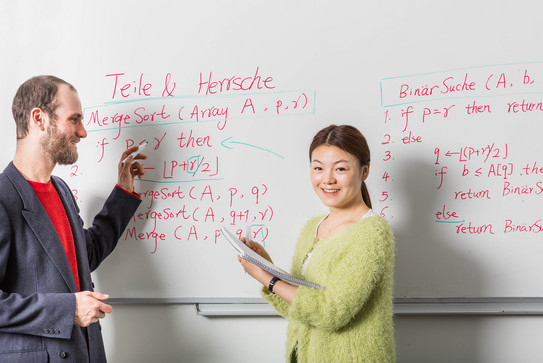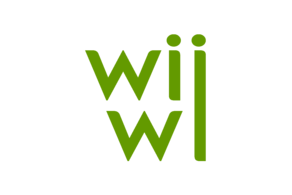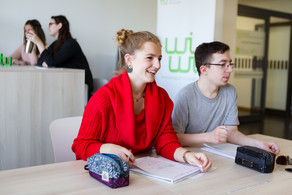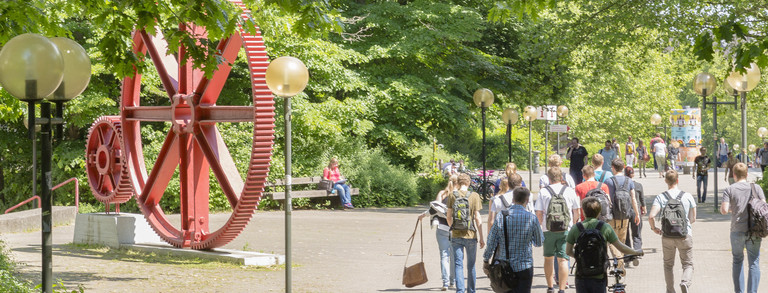Minor Subject Agreements
The Department of Business and Economics is involved in numerous degree programs at TU Dortmund University within the framework of minor, complementary and applied subjects. In addition, it has established the interdisciplinary degree programs Industrial Engineering, Business Mathematics, Economic Policy Journalism and Econometrics with the departments of Mechanical Engineering, Mathematics, Cultural Studies and Statistics. Below is an overview of the modules that can be taken for all the study programs concerned.

Bachelor
Modules must total exactly 15 credits:
- 1-2 bachelor modules 2-6, each comprising 7.5 or 15 credits.
- Additional modules can only be taken under certain requirements (link in German) and students must register (link in German) for these modules. Consultation with the department's Management Studies and Teaching is strongly recommended.
Bachelor - with spezialisation in services
Modules must total exactly 30 credits:
- 1-2 bachelor modules 2-6, each comprising 7.5 or 15 credits for a total of 15 credits and
- 1-2 bachelor modules 2-6, 8a-d Business Informatics or 8a-d Production and Logistics totaling 15 credits
- Additional modules can only be taken under certain requirements (link in German) and students must register (link in German) for these modules. Consultation with the department's Management Studies and Teaching is strongly recommended.
Master
Modules must total exactly 15 credits:
- 2 bachelor modules 8a-d, each comprising 7.5 credits.
Note: In this specialisation students may only select courses from business administration subjects Finance, Human Resource Management, International Management, International Accounting and Auditing, Marketing, Operations Research, Production and Logistics, Corporate Taxation, Corporate Management, Corporate Accounting and Controlling as well as Business Information Systems.
- Additional modules can only be taken under certain requirements (link in German) and students must register (link in German) for these modules. Consultation with the department's Management Studies and Teaching is strongly recommended.
Bachelor
Modules must total exactly 60 credits:
- 2-6 bachelor modules 2-7, each comprising 7.5 or 15 credit points, totaling 30 or 45 credit points, and
- 2 or 4 bachelor modules 8a-d, each comprising 7.5 credit points, for a total of 15 or 30 credit points.
- Additional modules can only be taken under certain requirements (link in German) and students must register (link in German) for these modules. Consultation with the department's Management Studies and Teaching is strongly recommended.
Bachelor
Modules must total exactly 60 credits:
- bachelor modules 4a and 4b, as well as 5a and 5b, each comprising 7,5 credits for a total of 30 credits (mandatory),
- 4 bachelor modules 8a-d, each comprising 7,5 credits for a total of 30 credits
Note: sociology modules may not be chosen, one seminar must be included - Additional modules can only be taken under certain requirements (link in German) and students must register (link in German) for these modules. Consultation with the department's Management Studies and Teaching is strongly recommended.
Master
Modules must total exactly 37,5 credits:
- 5 master modules, each comprising 7,5 credits
Note: modules from sociology or commercial and company law may not be included. - Additional modules can only be taken under certain requirements (link in German) and students must register (link in German) for these modules. Consultation with the department's Management Studies and Teaching is strongly recommended.
Bachelor
Modules must total 7,5 credits (creditable for 4 credits):
- 1 bachelor module 4a, 4b, 5a, 5b, 6a, 6b, 7a, 7b or 8a-d as well as master module Innovationsmanagement VI, each comprising 7.5 credits.
Master
Modules must total 7,5 credits (creditable for 4 credits) or 15 credits (creditable for 8 or 13 credits):
- 1 or 2 bachelor modules 2 - 8a-d as well as master module Innovationsmanagement VI, each comprising 7.5 or 15 credits.
Bachelor
One of the following modules can be chosen (within the module catalog "Applications") with a total of 7,5 credits:
- Applied Economics II ("Applied Eocnometrics")
- Microeconomics I ("Introduction to Game Theory")
- Microeconomics II ("Causal Analysis: Economics meets Data Science")
Master
The following module can be chosen (within the module catalog "Methods") with a total of 7,5 credits:
- Microeconomics I ("Game Theory")
Additional modules can only be taken under certain requirements (link in German) and students must register (link in German) for these modules. Consultation with the department's Management Studies and Teaching is strongly recommended.
Master
Modules can be taken to a maximum of 45 credits:
- Students may select only from the following master modules: Finance I, III and V, Applied Economics I-III, Intenational Economics I and II, Macroeconomics I and III-V, Microeconomics I and II, Public Finance I, Urban, Regional and International economics IV as well as Economic Policy I.
- Additional modules can only be taken under certain requirements (link in German) and students must register (link in German) for these modules. Consultation with the department's Management Studies and Teaching is strongly recommended.
Finance I, III und V, Applied Economics I-III, Internationale Wirtschaft I und II, Makroökonomie I und III-IV, Mikroökonomie I und II, Öffentliche Finanzen I, Urbane, regionale und internationale Wirtschaftsbeziehungen sowie Wirtschaftspolitik I.
Bachelor and Master
Additional modules can only be taken under certain requirements (link in German) and students must register (link in German) for these modules. Consultation with the department's Management Studies and Teaching is strongly recommended.
Bachelor
Modules must total exactly 45 credits::
- 2-4 bachelor modules 2-7, each comprising 7.5 or 15 credits.
a total of 30 credits and - 2 bachelor modules 8a-d, each comprising 7.5 credits
total 15 credits.
Bachelor
Modules must total exactly 60 credits:
- Bachelor modules 4a and 4b, as well as 5a and 5b, each comprising 7,5 credits, for a total of 30 credits (mandatory)
- 2-4 bachelor modules 2-9 ("Privatrecht" - civil law), each comprising 7,5 or 15 credits, for a total of 30 credits.
- Additional modules can only be taken under certain requirements (link in German) and students must register (link in German) for these modules. Consultation with the department's Management Studies and Teaching is strongly recommended.
Bachelor with Industrial Management Specialization
Modules must total exactly 75 credits:
- Bachelor modules 4a and 4b, as well as 5a and 5b, each comprising 7,5 credits, for a total of 30 credits (mandatory)
- 4-6 bachelor modules 2-9 ("Privatrecht" - civil law), each comprising 7,5 or 15 credits, for a total of 45 credits.
- Additional modules can only be taken under certain requirements (link in German) and students must register (link in German) for these modules. Consultation with the department's Management Studies and Teaching is strongly recommended.
Master
Modules must total exactly 15 credits:
- 2 master modules, each comprising 7,5 credits.
- Additional modules can only be taken under certain requirements (link in German) and students must register (link in German) for these modules. Consultation with the department's Management Studies and Teaching is strongly recommended.
Master with Industrial Management Specialization
Modules must total exactly 30 credits:
- 4 master modules, each comprising 7,5 credits.
- Additional modules can only be taken under certain requirements (link in German) and students must register (link in German) for these modules. Consultation with the department's Management Studies and Teaching is strongly recommended.
Bachelor and Master
Comprehensive information on the Bachelor's/Master's degree programme is available on the website of the Department of Computer Science.
Additional modules can only be taken under certain requirements (link in German) and students must register (link in German) for these modules. Consultation with the department's Management Studies and Teaching is strongly recommended.
Bachelor
Modules must total exactly 30 Credits:
- 2-4 bachelor modules 2-8a-d, each comprising 7.5 or 15 credits
Bachelor
Modules must total exactly 60 credits:
- 2-4 bachelor modules 2-7, each comprising 7.5 or 15 credits, for a total of 30 credits and
- Bachelor modules 8a-d Production and Logistics I and II for a total of 15 credits and
- 2 bachelor modules 8a-d or 9 (private law), each comprising 7.5 credits for a total of 15 credits
- Additional modules can only be taken under certain requirements (link in German) and students must register (link in German) for these modules. Consultation with the department's Management Studies and Teaching is strongly recommended.
Master
Modules must total exactly 15 credits:
- 2 master modules, each comprising 7.5 credits.
- Additional modules can only be taken under certain requirements (link in German) and students must register (link in German) for these modules. Consultation with the department's Management Studies and Teaching is strongly recommended.
Bachelor
Modules must total exactly 30 credits:
- 2-4 bachelor modules 2-8a-d, each comprising 7.5 or 15 credits. Note: only modules from business administration or economics, not sociology.
- Additional modules can only be taken under certain requirements (link in German) and students must register (link in German) for these modules. Consultation with the department's Management Studies and Teaching is strongly recommended.
Master
Modules must total between a minimum of 22,5 and maximum of 30 credits:
- 3-4 master modules, each comprising 7.5 credits. Note: sociology and law courses cannot be included.
- Additional modules can only be taken under certain requirements (link in German) and students must register (link in German) for these modules. Consultation with the department's Management Studies and Teaching is strongly recommended.
Bachelor
Modules must total either 7,5 or 15 credits:
- 1 or 2 bachelor modules 2-8a-d, each comprising 7.5 or 15 credits.
- Additional modules can only be taken under certain requirements (link in German) and students must register (link in German) for these modules. Consultation with the department's Management Studies and Teaching is strongly recommended.
Bachelor
Modules must total exactly 7,5 credits:
- 1 bachelor module 4a, 4b, 5a, 5b, 6a, 6b, 7a, 7b or 8a-d, each comprising 7.5 or 15 credits.
- Additional modules can only be taken under certain requirements (link in German) and students must register (link in German) for these modules. Consultation with the department's Management Studies and Teaching is strongly recommended.
Master
Modules must total either 7,5 credits or 15 credits:
- 1 or 2 bachelor modules 2 - 8a-d, each comprising 7.5 or 15 credits.
- Additional modules can only be taken under certain requirements (link in German) and students must register (link in German) for these modules. Consultation with the department's Management Studies and Teaching is strongly recommended.
Bachelor
Modules/Courses must total exactly 20 credits:
- Bachelor module 5a or 5b, each comprising 7,5 credits
and - 1 bachelor module 8a-d from the field of economics, each comprising 7,5 credits
and - 1 bachelor seminar from the field of economics.
- Additional modules can only be taken under certain requirements (link in German) and students must register (link in German) for these modules. Consultation with the department's Management Studies and Teaching is strongly recommended.
Bachelor
Modules must total exactly 30 credits:
- 1-2 bachelor modules 2 - 7a, each comprising 7.5 or 15 credits, for a total of 15 credits and
- 1-2 bachelor modules 2 - 7a or 8a-d, each comprising 7.5 or 15 credits, for a total of 15 credits.
- Additionally, the module OR can be selected in the numerics module.
- Additional modules can only be taken under certain requirements (link in German) and students must register (link in German) for these modules. Consultation with the department's Management Studies and Teaching is strongly recommended.
Master
Modules must total exactly 22,5 credits:
- 3 master modules, each comprising 7.5 credits.
Note: The Master module "Wirtschaftsstatistik" (Business Statistics) may not be choosen. - Students with the specialization "Amtliche Statistik" (Official Statistics) can only choose from the module catalogs of Macroeconomics, Public Finance, Management Accounting & Controlling or Economic Policy. Students with the "Ökonometrie" (Econometrics) specialization must complete the bachelor modules Operations Research I and II.
- Additional modules can only be taken under certain requirements (link in German) and students must register (link in German) for these modules. Consultation with the department's Management Studies and Teaching is strongly recommended.
If you have any questions, please contact the Management for Studies and Teaching.








